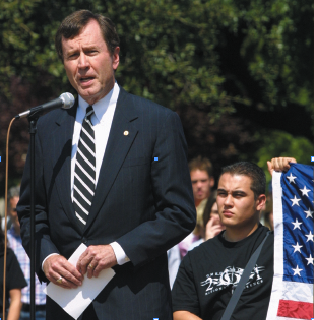
President R. Gerald Turner consoles the SMU community for the noon vigil at the Flagpole on Sept. 11, 2001. He urged members of the community to pull together. (Moses Odria/The Daily Campus)
Nearly 10 years ago, President R. Gerald Turner held an all community meeting at the flagpole to discuss the horrific events that unfolded that morning.
“When you have a university community in crisis, they want to gather,” Turner said in a recent interview. “It was crucial that we provided that opportunity.”
The day was Sept. 11, 2001 and Turner had a full day of meetings planned.
However, his whole day changed when his assistant informed him that a plane had just crashed into one of the World Trade Towers in New York City.
Turner turned on the TV in his office, watching it as the meetings continued on schedule.
Once it was broadcasted that the second tower had been hit, Turner realized that support and comfort needed to be spread on campus.
“I knew, just immediately, that this would be so traumatic to the campus — to the university community,” he said.
Around noon that day, approximately 2,000 to 3,000 students, faculty, staff and administrators gathered around the flagpole to listen to Turner’s remarks and find places on campus where they could go to find comfort or discuss
the day’s events.
“It was one of my proudest days — how the university responded to that incredible shock and how supportive and responsive we were to people in need and people who felt at risk, particularly our international students,” Turner said.
The Counseling Center and the chaplain made themselves available to students, as well as professors and other faculty.
One of Turner’s main concerns was for SMU’s Muslim students.
“I knew they would feel threatened by this because it was clearly fairly early on that these were Islamic extremists,” he said. “People didn’t know that these were just people who were perverting and using religion for their political issues.”
He was worried that the Muslim students, or any international students, would feel harassed or in danger.
But, that was not the case at SMU.
“I was so proud of our community because they weren’t [harassed] here, and in so many places in the country they were,” Turner said.
Unlike many universities on 9/11, SMU held classes for the rest of the day.
SMU was criticized, as people believed the university was not showing proper respect for those who had died.
Turner believed otherwise.
“We did [show respect] by making sure there were opportunities to discuss the issues but mainly we were being careful with our students, our own community,” he said. “People wanted to talk about this.”
Professors made themselves available for students to talk about the events.
Classes merged with other classes to talk about the day’s occurrences, especially with political science and religion classes.
Though Sept. 11 was a day that affected the lives of millions of people around the world, Turner believes the support on campus that day, specifically in the classroom, had real value.
“For it to have been such a sad day, I just think it was the community at it’s best by being responsive to its members,” Turner said. “It was really a day that the faculty and support staff really served the students extremely well.”








